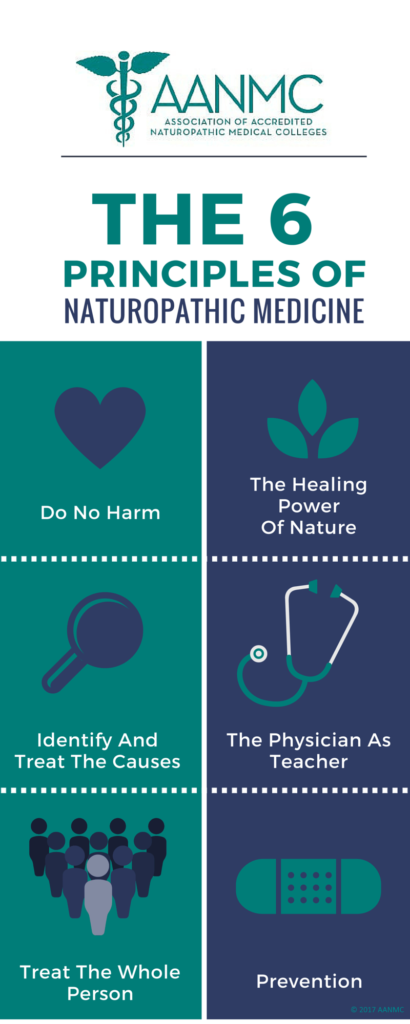What is Naturopathic Medicine?
Naturopathic medicine concentrates on whole-person wellness; the medicine is tailored to the individual and emphasizes prevention and self-care.
Naturopathic medicine attempts to find the underlying cause of a patient’s condition rather than focusing solely on symptomatic treatment. Naturopathic physicians cooperate with all other branches of medical science referring patients to other practitioners for diagnosis or treatment when appropriate.
Naturopathic Medicine has Six Core Principles that inform its Philosophy

Naturopathic Education
A Licensed Naturopathic Doctor (N.D.) attends a four-year graduate level Naturopathic medical school accredited by the Council on Naturopathic Medical Education (CNME) and is educated in all of the same basic sciences as an M.D. while also studying holistic and nontoxic approaches to therapy with a strong emphasis on disease prevention and optimizing wellness.
In addition to a standard medical curriculum, Naturopathic Doctors are required to complete at least a year of training in each of the following: physical medicine, clinical nutrition, botanical medicine, homeopathic medicine and counseling.
A Naturopathic Doctor takes rigorous professional board exams so that he or she may be licensed by a state or jurisdiction as a primary care general practice physician.
Look under ‘Resources’ for links to the American Association of Naturopathic Physicians (for more information on NDs and their training) and Bastyr University, where Dr. Egginton attended medical school.
For more information, see: http://www.cnme.org/
What is Preventative Medicine?
Preventative medicine takes into account a person’s family medical history and their environment to consider what diseases they are at risk for.
By establishing a strong foundation to health through improved diet and lifestyle habits and optimal functioning, disease risks can be lessened and optimal health can be achieved.
While routine immunizations and diagnostic screens such as pap smears, mammograms and colonoscopies are referred to as preventative medicine, true preventative medicine involves optimizing the body’s function so that innate healing addresses disease processes before the point of diagnosis or symptoms.
Dr. Egginton will teach you what improvements will help you to avoid the unnecessary burden of chronic disease.
For patients dealing with a disease diagnosis, preventative strategies can help avoid sequelae, or additional complications, that may result from living with chronic disease.
What is Genomic Medicine?
Genomic medicine is the most current recent iteration of preventative medicine, based on our new knowledge of the human genome. It is a highly individualized approach to healthcare, based on the genetic mutations (or SNPs) of a person while also taking into account their family history, lifestyle and environmental exposures.
Our understanding of the role of genetic mutations in one’s health is quickly developing but using genetic tests is a powerful way to understand what an individual may be pre-disposed to and to tailor our preventative strategies most effectively.
What’s the difference between Naturopathic Medicine and Functional Medicine?
Given the demand for more patient-centered and holistic medicine, some medical doctors have pursued additional training to learn about herbs, nutrition and other natural therapies.
These holistically minded doctors are drawing on the history and philosophy of Naturopathic Medicine which has been practiced in this country for over a hundred years after drawing on traditional medicine from Europe.
Functional medicine was developed by Jeffry Bland, who founded the Institute of Functional Medicine in the 1990s which has been the primary center for training MDs and DOs on taking a more holistic approach to patient care.
Functional medicine is essentially a re-branded and re-marketed version of Naturopathic medicine.
Given the short nature of this training, however, many Functional medicine doctors are still treating symptoms, albeit with natural therapies. They have not spent the time that Naturopathic Doctors have learning the philosophy of identify and treating the root cause of illness and disease.
Where as MDs and DOs undergo independent study in natural medicine in a piecemeal fashion after graduation in order to specialize in functional medicine, NDs are taught this integrative approach from day one of their medical training in addition to all the same sciences as MDs.
Holistic MDs and Functional doctors also know much more about herbs and nutrition than the run-of-the-mill MDs but their knowledge is inconsistent from provider to provider and there is no standard exam for these doctors to demonstrate their skill.
NDs are well versed in herbal medicine, nutrition, homeopathy, and orthomolecular medicine as the naturopathic medical program mandates these subjects be included not only in the medical curriculum, but also assessed during clinical rotations and tested in the national naturopathic medical board examinations (NPLEX I and NPLEX II).” -Erica Zelfand, ND
“Our Mission is to create a community oriented practice where you and your loved ones can find a more holistic and preventative approach to health and disease and discover evidence-based options for healing and feeling your best.”

